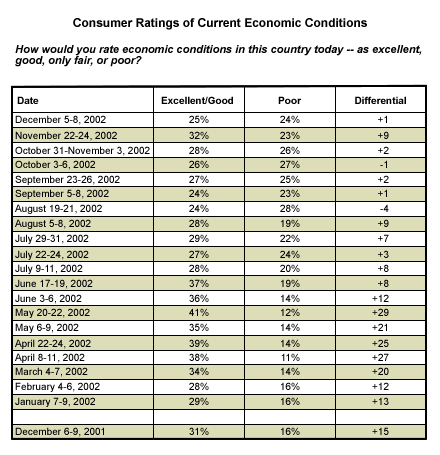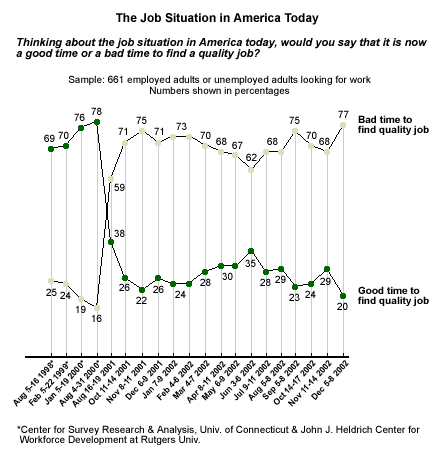Economic prognosticators looking for the consumer to be the force that keeps the economy growing in the months ahead must have been encouraged by last Friday's release of the University of Michigan's preliminary survey results that showed consumer sentiment increased for the second month in a row in early December. Of course, their joy was nothing compared to that of those retailers betting on another last-minute surge in holiday buying this year, as happened in 2001.
Unfortunately, the equity markets were probably right to pay little attention to the new Michigan data, which should be highly discounted given its small sample size of only 300 interviews. Even more importantly, this positive reading of consumer perceptions runs completely contrary to what consumers are telling Gallup.
Consumers Rate Economic Conditions as Weak…
According to the most recent Gallup economic poll (Dec. 5-8)*, only one in four Americans rates current economic conditions as good or excellent (25%) and essentially the same percentage (24%) rates them as poor. This positive differential of one percentage point is down eight points from late November (Nov. 22-24), but still above the negative four-point differential from Aug. 19-21 -- the low point for the year. The current reading is substantially below the 15-point differential of a year ago (Dec. 6-9, 2001) and way below this year's largest positive differential of 29 (May 20-22).

. . . And Say It Is a Bad Time to Find a Job
More than three in four Americans (77%) who are either employed or unemployed and looking for work say now is a bad time to find a quality job. This is the highest percentage of the year and up nine points from 68% in November. A year ago, 71% of Americans said it was a bad time to find a quality job. The previous high point was in November 2001, when 75% of Americans said it was a bad time to find a job. In sharp contrast, 78% of Americans said it was a good time to find a job in August 2000.

Key Points
Not only do many American consumers currently rate the economy poorly, but more than half say economic conditions in the country as a whole are getting worse (54%) as opposed to getting better (35%). Still, the most disturbing aspect of consumer perceptions of the current economy is their pessimism about the job market. The fact that only one in five Americans says that now is a good time to find a job seems to confirm the reality of the latest surge in the unemployment rate to 6% -- an economic statistic the stock market did not ignore.
Many on Wall Street and in the government have said that the current economy is in "a jobless recovery." However, there's a fine line between such a jobless recovery and a recession. If layoffs persist and the unemployment rate continues to rise, it will be hard to deny the oft-maligned notion of a double-dip recession in early 2003. This threat may actually help the administration's new economic team as they try to push an economic stimulus package through Congress early next year. But for the rest of us, such thoughts do not a merry holiday make.
*Results are based on telephone interviews with 1,001 national adults, aged 18 and older, conducted Dec. 5-8, 2002. For results based on the total sample of national adults, one can say with 95% confidence that the maximum margin of sampling error is ±3%. For results based on the sample of 661 adults employed full or part time or unemployed adults looking for work, the maximum margin of sampling error is ±4%. In addition to sampling error, question wording and practical difficulties in conducting surveys can introduce error or bias into the findings of public opinion polls.

